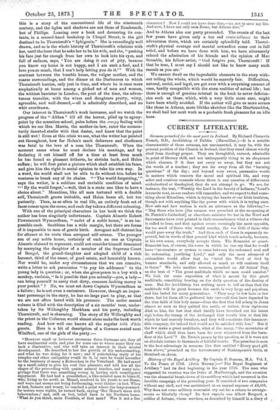CURRENT LITERATURE.
Sermons preached for the most part in Ireland. By Richard Chenevis Trench, D.D., Archbishop of Dublin. (Macmillan.)—It is a notable characteristic of those sermons, not unconnected, it may be, with the- present position of the Church in Ireland, that they stand almost wholly aloof from theology proper. They are thoughtful, earnest, admirable in point of literary skill, and not unfrequently rising to an eloquence which charms, if it does not carry us away, but they are not the words of a teacher ; they are far away from all the "burning
questions " of the day ; and beyond very sweet, persuasive words. in matters which concern the moral and spiritual life, and very sober and cautious counsels where there is any question of differences ecclesiastical or theological, they do not attempt to go. We see, for instance, the text, " Worship the Lord in the beauty of holiness," Laud's- favourite text, as our readers will remember, and we expect to find some- thing about Ritualism, which is trying the hearts of our Irish brethren, though not with anything like the power with which it is trying ours. How safe and how useless is such an utterance as the following l- " May those who here [the sermon was preached at the re-opening of St. Patrick's Cathedral] or elsewhere minister for her in the Word and Sacraments have ever printed in their remembrance what a witness she is called to bear, and that against errors seemingly the most opposite, the too much of those who would overlay, the too little of those who• would pare away the truth." And then each of these is separately re- proved, but in words of that general kind which touch nobody, because, in his own sense, everybody accepts them. The Romanist or quasi- Romanist has, of course, his sense in which he can say that he would have "no creature or system to come between the redeemed soul and its redeeming, justifying Lord ;" and only the moat advanced of rationalists would allow that he "tried the Word of God by human standards, and only allowed so much as will conform itself to these." We take another sermon, preached on All Saints' Day, on the text of " The great multitude which no man could number." We look for some exposition of what is meant by this great multitude, something bearing on the daily question of the destiny of man. But the Archbishop has nothing more to tell us than that the multitude will be great because the earth is very large and populous, and has lasted for many generations. "They may be few here or few there, but let them all be gathered into one—all that have departed in the true faith of this holy name—from the first that fell asleep in Jesus almost as soon as they quitted the earth, or rather, from righteous- Abel to him, the last that shall hardly have breathed out his latest sigh before the trump of the Archangel that recalls him to that life which he had scarcely forsaken, and they will constitute this innumer- able company, for indeed God would not bo satisfied with less." But if the few make a great multitude, what of the many, "the mountains of chaff which shall thus have been for ever winnowed from the barn- floor of the Lord"? Dr. Trench passes by the question, as if it were not an absolute torture to thousands of faithful hearts. The preacher is soon to the best advantage in sermons like that entitled "Every good gift from above," preached on the tercentenary of Shakespeare's birth, at Stratford-on -Avon.






































 Previous page
Previous page